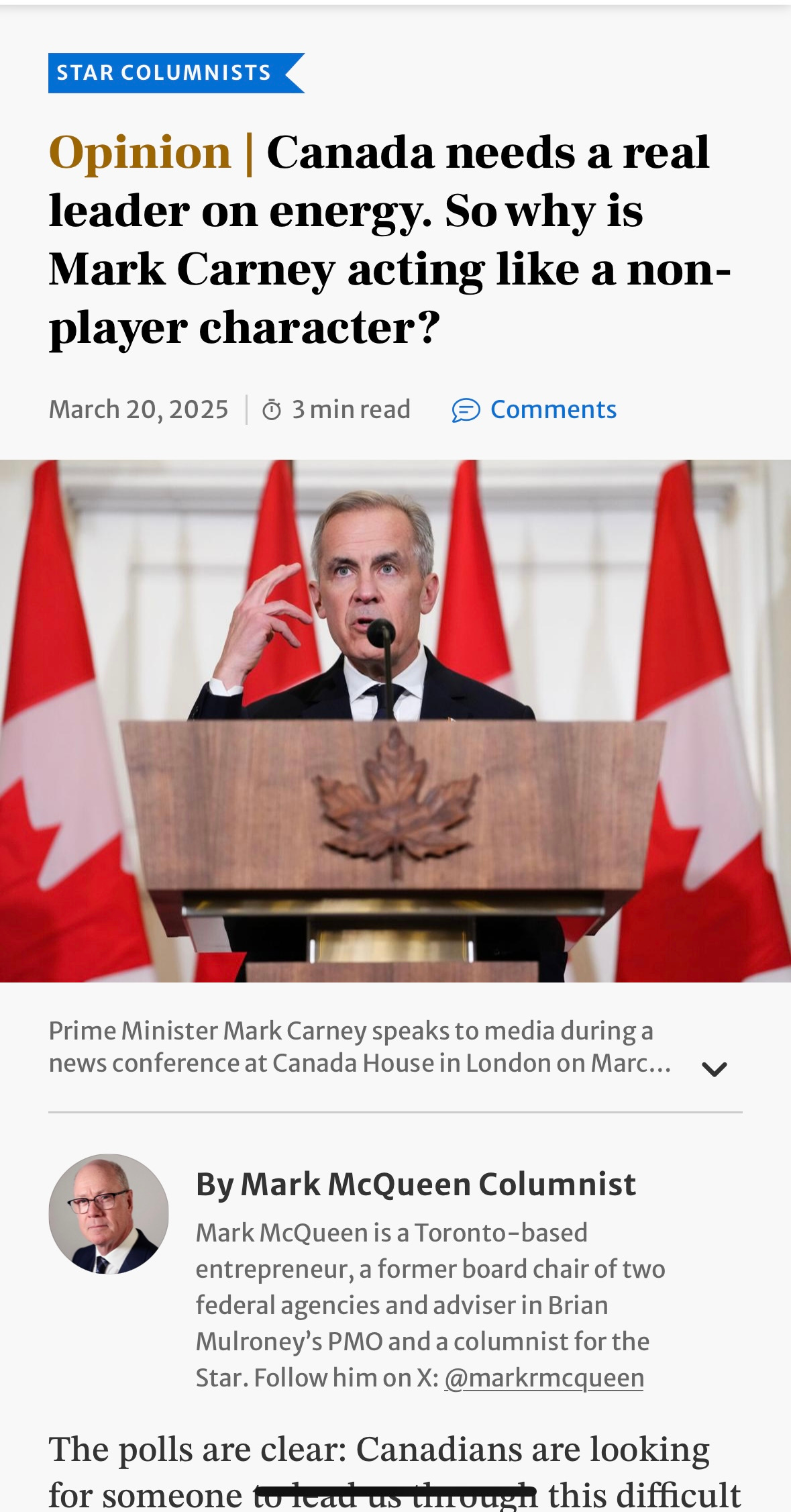Canada needs a real leader on energy. So why is Mark Carney acting like a non-player character?
This is no time for NPCs
If you’re new to the space and looking to learn more about the eventual winner of the next election, my past Toronto Star take(s) on the two possible victors can be found here:
Carney seems to be following another Liberal’s roadmap — and it’s a cynical one (Mar 12-25)
Will the real Mark Carney please stand up? (Jan 22-25)
What Mark Carney might have said to Justin Trudeau: an imagined conversation (July 24-24)
Bank chiefs walk tightrope on energy evolution (June 12-24)
Poilievre’s Superpower: he doesn’t care what “we” think of him (Apr 3-24)
As this Star column is off-cycle, I’m posting the entire piece. If you want to encourage more balanced journalism in our country, feel free to buy a print copy and let the Editor know why. Google is not the answer to what ails the Canadian mainstream media — that falls to all of us. You can also subscribe to the Star online via my special discount code: www.thestar.com/informed.
The polls are clear: Canadians are looking for someone to lead us through this difficult patch. There was even a moment during Mark Carney’s Liberal leadership acceptance speech when it seemed as though he understood the assignment. He hinted that common sense would finally prevail, that he would dispense with a decade of Liberal orthodoxy that had demonized Canada’s oil and gas sector.
By promising to make Canada a “superpower in both clean and conventional energy,” our new prime minister seemed to be prioritizing Canadian jobs over his stated fear that climate change is a “tragedy on the horizon” that will lead to the loss of countless lives.
For voters waiting to see whether Carney’s policies will differ from those of Justin Trudeau, energy is a key topic to watch. On Wednesday, CEOs representing the four largest pipeline companies and the 10 largest oil and natural gas companies reminded our federal leaders that if Canada is to become a global energy superpower, as Carney has promised, Ottawa will need to declare that certain new infrastructure projects are in the “national interest” under existing emergency legislative powers.
Anita Anand, our new minister of innovation, science and industry, describes Carney’s government as being on a “wartime footing,” and I’m all for it. The challenge with using such Churchillian imagery, though, is the follow-through — and that’s where Carney risks looking more like Hamlet than Sir Winston.
Rather than go to Washington and defuse the ongoing trade war, our new PM accepted invitations to visit his fellow leaders in London and Paris, cities that — notably — do not hold the key to resolving our trade crisis.
By promising that his “new government is changing how we work so we can deliver better results faster,” Carney tantalized voters with the notion that his trip to Europe would result in a path forward for actionable, reliable energy partnerships. Following his high-level diplomatic engagements, one francophone journalist’s question served to test Carney’s vows: What “timeline he had set for infrastructure projects to be built in Canada, two or three years?”
Carney replied that while “I am open to east-west projects, that is not my decision” and cited the role that energy companies, provincial premiers and First Nations also play. “There’s a lot to be done before a project can be realized, so we’ll see.”
Voters are yearning for decisive leadership, yet Carney’s response channeled Kim Campbell more than the warrior Churchill. During the 1993 federal election, then-PM Campbell was reported to have said, “An election is no time to discuss serious issues” (a quote that she disputed). While it might be true that a 47-day campaign wasn’t long enough to tackle every possible policy solution, voters weren’t looking for clinical pragmatism — they wanted someone to lead them out of a difficult global recession.
Given that Carney has offered himself up as an experienced “business leader” with a wartime cabinet, Canada’s energy industry must wonder if the PM’s true preference is to be a non-player character where it’s concerned.
During a recent call with institutional investors, Enbridge CEO Greg Ebel said that when it comes to energy exports, Canada has been “missing the boat.” Enbridge’s Northern Gateway pipeline project, approved by Stephen Harper’s government in 2014, would have delivered Canadian oil to new Asian markets at better prices than we currently get from U.S. buyers.
Enbridge had the regulatory approvals in hand, as well as Indigenous participation and strong customer support, but Trudeau promised voters in 2015 that the project “will not happen” if he were elected. The Liberal cabinet tied the project up in knots, eventually passing a law in 2019 prohibiting tankers from docking along British Columbia’s northern coast — ensuring the pipeline’s demise. Enbridge wasted hundreds of millions of dollars, which negatively impacted the pensions of every Canadian worker.
As these CEOs have reminded Carney, if he’d just lead the charge on new pipelines, Canada could get thousands of new jobs, and our resources “could replace the more emissions-intensive coal-fired electricity generating plants throughout Asia.” As a sign of good faith to the energy industry, Carney should start by lifting the tanker ban.
This is no time for non-player characters.
MRM
(this post is an Opinion Piece)




